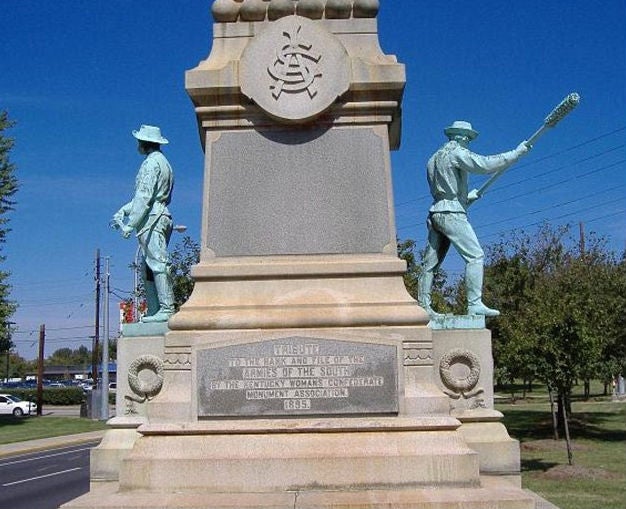Judge orders Kentucky city to take down 70-foot ‘symbol of slavery’ monument
The Confederate soldiers monument was erected 121 years ago and stands on the campus at the University of Louisville

A city in Kentucky has been ordered to remove a century-old statue commemorating the death of Confederate soldiers who fought in the Civil War.
Critics had objected to the 70-foot monument, calling it a “symbol of slavery” and honoring a “very dark period in American history”.
Louisville mayor Greg Fischer said he would work to relocate the monument after judge Judith McDonald-Burkman, who had deliberated on the matter for three weeks, decided to accept their case.
In doing so, she ruled against the plaintiffs, a group of local residents and male descendants of Confederate soldiers who had sued to keep the monument next to the University of Louisville and who claimed the “floodgates had opened to destroy all Southern heritage”.
They fear the monument will end up in the landfill as a new location has not been disclosed.
The plaintiffs won a temporary restraining order while the judge considered their arguments that the monument was not owned by the city, that it could be damaged and “violate historic preservation rules”.
A university diversity group countered those claims, and became part of a national push to remove Confederacy symbols which, they argued, fostered racism.
“I think the community and country is better for this decision today,” said Ricky Jones, professor and chair of Pan-African Studies, told the Courier Journal.
Flags, monuments and other Confederate emblems have become a political hot potato since a white gunman who posed with the Confederate flag allegedly killed nine black churchgoers in Charleston, South Carolina, last July.
In the 29th century, the state of Kentucky was on the side of the Union, yet many Kentuckians fought on behalf of the South, which wanted to have its own government and retain its slave trade. The split led to the US Civil War between 1861 and 1865.
On 29 April 2016 the mayor and the university president, James Ramsey, announced that the 1895 monument would be dismantled from the campus grounds and would be moved to an undetermined location.
One of the plaintiff’s lawyers, J Andrew White, questioned the judge if the state of Thomas Jefferson - a slave owner - outside the Louisville mayor’s office would also be taken away.
The 1895 monument cost $12,500 to erect and the money was raised by women who knew men who had died in the war.
Join our commenting forum
Join thought-provoking conversations, follow other Independent readers and see their replies
Comments